Bob Hawke would never have been prime minister today
A nasty, self-obsessed, unpleasant, boring narcissist, Bob Hawke would have been cancelled. But we fool ourselves this is progress.
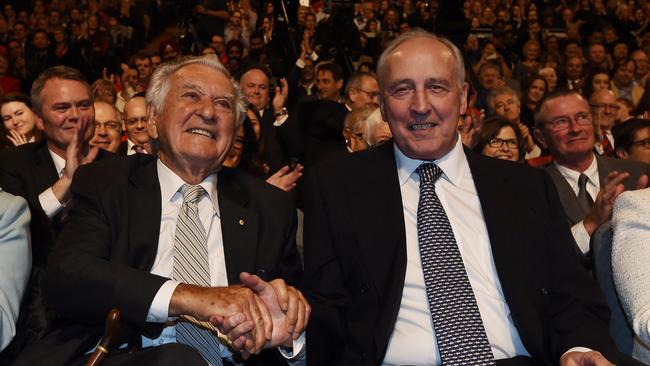
In his biography Bob Hawke: Demons and Destiny, my colleague Troy Bramston salutes Hawke as Labor’s best prime minister since World War II – a judgment widely shared – yet he calls Hawke “a deeply flawed person” and adds the killer line that “his behaviour would not be tolerated today”.
Bramston’s right. Hawke’s private life means his prime ministership today would be untenable. It could not happen. It would be cancelled. What worked in the 1980s doesn’t work in the 2020s. But we need to think about this since it was under Hawke that Australia’s economy and social policy was taken to a new maturity that benefited nearly everyone.
It means Labor’s best prime minister for 75 years would not be a viable proposition today because of our changed standards. The question becomes: is this progress or is it regression? The contrast between Hawke’s world and today’s world could hardly be greater. Hawke’s world was private scandal and public achievement – but today’s world is private accountability and a demoralising brand of public policy stalemate. And we fool ourselves this is progress.
When Hawke first talked of “consensus” of “bringing Australians together” and getting business and unions to co-operate, he was mocked by the hard heads because he was looking outside Labor, reaching beyond narrow party politics. Yet he had the personal magnetism and self-confidence to govern this way for years. The contrast with today’s public disillusionment, character assassination, blame shifting and exploitation of social fragmentation could hardly be greater.
The Hawke story as told by Bramston is a reminder of what Australia has lost – leadership based on an uplifting vision, Hawke’s ability to persuade and reason, gifting co-operative agreement over ideological divisions, improving lives by pioneering innovative policy and prioritising the national interest before narrow, partisan self-interest. Hawke and Paul Keating took Australia on to a higher plateau as a better performing country. Hawke was a Labor man who possessed a vision that transcended Labor.
It is understandable that ALP leader Anthony Albanese says if elected he will promote consensus and take his lead from the Hawke-Keating era – that’s to be welcome. But none of the conditions that made the Hawke government successful exist today. Consensus and reform have been extinguished for nearly 20 years. Hawke-era invocations are a hollow gesture to a time long gone and not about to return. Only the foolhardy could think otherwise.
Bramston’s book gives us permission to talk more honesty about Hawke and that means we understand ourselves better. Hawke was a complex contradictory figure, his flaws and glories writ large. We all think we know Hawke but this book shoves the Hawke conundrum in our face.
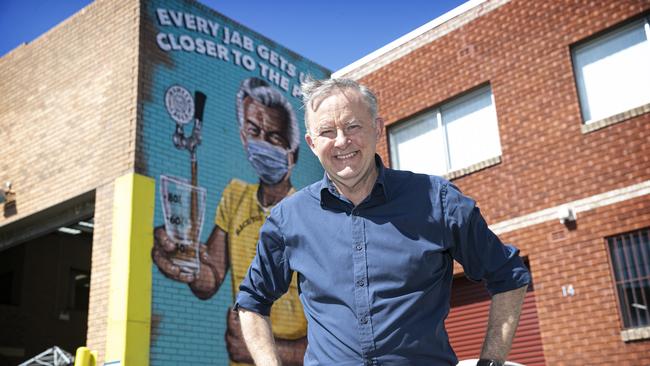
Bramston shows that Hawke, in many aspects of his private life, was a nasty, self-obsessed, unpleasant, boring narcissist. For much of his life he was a shocking, savage drunk, an alcoholic despite his reluctance to admit it, a compulsive and reckless sex addict who would treat some women with contempt and a man who repeatedly failed in his obligations to his family.
One of his political supporters, Gareth Evans, told Bramston: “Bob was never a bloke you went out to dinner with … He was utterly uninterested in the normal association you develop with someone over time which involves going out to dinner and chatting over things. His interests were having a beer, sex, sport, gambling and making a buck. Bob had no interest in history, art, literature.”
Hawke valued integrity in public life but discounted the same integrity in his private life. “Getting pissed and gambling and f..king other women was not something that troubled him,” Evans said. Former journalist and campaigner consultant Richard Farmer said Hawke loved casinos. “He would do anything to be at the blackjack table, smoking cigars and then have a root somewhere afterwards.”
His business friends, Sir Peter Abeles and George Rockey, paid his bills, gave him money, ran protection for his mass indiscretions. Bramston said: “They paid his hotel bills, picked up the tab at the Boulevard Hotel – Hawke normally occupied the Lady Nelson suite … Hawke relied on Abeles to employ several former girlfriends …Abeles also paid Hawke’s mortgage and his children’s private school fees. Hawke simply could not afford the lifestyle he was leading in the 1970s without other sources of income.”
In his life Hawke was compromised financially and sexually. The scale of what he got away with is startling. The Hawke story reminds of the tough historical truth – great leaders aren’t always good people. If you demand your leaders be saints you won’t produce many leaders.
But there is no gainsaying that Hawke would have failed any Independent Commission Against Corruption type investigation, he would not have passed the current ministerial code standards, the ABC’s Four Corners would have destroyed him, he would have failed dismally on treatment of women in his private life. In the age of the MeToo movement, how many women would have come forward to name and shame him? How many moral guardians in the media would have claimed his political head?
In her brilliant speech launching the book, senior ALP figure Tanya Plibersek asked the pivotal question: does Hawke’s unacceptable behaviour destroy his broader legacy? She said it doesn’t. That is also Bramston’s conclusion. It is unquestionably right. It would have been a travesty had Hawke’s deeply flawed life been sufficient to deny his prime ministership. The nation would have been far poorer and substantially diminished.
Plibersek said the country wouldn’t tolerate today what Hawke did 40 years ago and she welcomed these higher standards. That is a good thing. But she correctly argued that Hawke grew throughout his life. “Flawed humans can change,” she said. “Flawed humans can do great things.” Hawke grew, he was a pragmatist willing to revise his views as opinions shifted.
Hawke as prime minister championed women’s causes in the Sex Discrimination Act, boosted childcare funds, encouraged female participation in public life. Plibersek quoted cabinet minister and feminist Susan Ryan saying she never felt any “sexism or misogyny” from Hawke or any “derogatory gender lens” in his tone – ever.
Hawke was great because his vision went beyond how Labor saw itself. Hawke’s egoism would not be limited by old-fashioned ALP dogma – and Keating was exactly the same. This is how they won five elections. They looked beyond Labor for policy design. It was Hawke who wrote in his 1983 election blueprint: “The essential malaise to be identified with the period of the Fraser government is the increasing erosion of any sense of common national purpose.”
Hawke ran a non-ideological government that aimed to rediscover common national purpose. He knew narrow, partisan, introspection would fail. He grasped this had been Labor’s achilles heel in the past. “He enlarged Labor’s mission, challenged its beliefs and made it fit to govern,” Bramston writes. It was “rarely smooth sailing, cabinet and party disputes were frequent but Hawke managed to keep Labor largely united”.
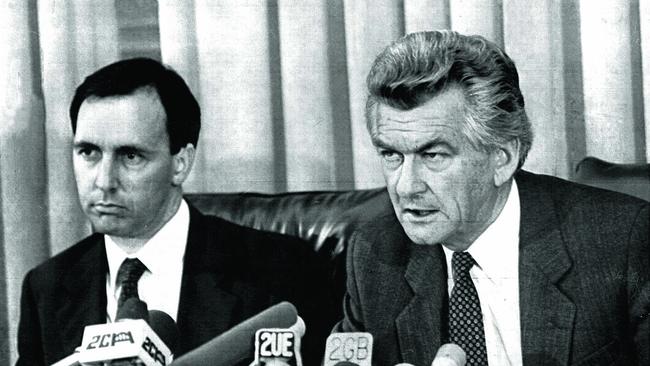
He achieved this with superior judgment, an acute reading of the Australian disposition and, above all, because the ultimate source of his authority was the Australian public, not the caucus.
Hawke-Keating policies smashed the prevailing Labor economic orthodoxy – floating the dollar, deregulating the financial system, dismantling the tariff, restoring the surplus, promoting a competitive economy – then they restored Medicare, created a national superannuation scheme, created HECS, saved the Franklin and Kakadu, and campaigned against racism.
Hawke, in tandem with Keating, challenged Labor to reinvent itself. In the end, beyond the Hawke-Keating era, Labor declined the challenge. But the ritual is entrenched – every Labor leader feels compelled to announce they follow in the Hawke-Keating tradition when it is apparent the party walked away from that tradition long ago and many ALP figures are clueless about what it even means.
Bramston quoted Hawke warning that contemporary Labor had drifted away from the vision he and Keating had entertained. “We were able to call on all sections of Australia and did successfully and that is not happening now,” he said in 2018.
Hawke’s judgments about his successors were slanted by self-interest – yet they reflect the relentless decline in our politics. While complimentary of Keating and John Howard, Hawke was dismayed by the quality of subsequent prime ministers. He disliked Kevin Rudd, who he believed was doomed by his method of government. He liked Julia Gillard and Tony Abbott but called Abbott a “hopeless” prime minister. He told Bramston that Malcolm Turnbull lacked conviction and courage, and was the worst PM since Billy McMahon.
Hawke saw the forces undermining our democracy and quality of public policy. Bramston said: “Hawke worried about the future of Australian democracy, the deteriorating quality of politicians, the health of political parties, the effectiveness of the national parliament and quality of public debate. He wanted politicians to work more cooperatively across the political spectrum … he thought social media was making politics dangerously tribal, combative and toxic.”
As Bramston said: “Hawke’s rise to power took place outside the political system.” Hawke became a celebrity, a television presence and a legend years before he became a parliamentarian. The sequence is fundamental. Australians were divided about Hawke but they saw themselves in many aspects of his life, his struggles and his character. This is what made his political persona unique.
His image as an Australian cult figure, strong before he entered politics, was reignited after his departure. For a nation hooked on soap operas, Hawke was the longest running real-life soap opera.
As Bramston said, Hawke was a brilliant actor “who could turn on a range of emotions as though flicking through index cards until he found the right one: charm, persuasion, indignation, anger, sadness, humour”. He believed in reason yet his expertise was emotional rapport and manipulation.
Hawke captured the imagination of Australia – a man who liked a beer, liked his footy and played up – yet proved as PM he could reform himself, at least in some respects. He quit the grog, developed a new work ethic and was conspicuous for sustained discipline. He kept having affairs at the Lodge, as Bramston says, but in the end there were two loves in his life, Hazel and Blanche d’Alpuget.
Hawke enjoyed a hefty degree of media protection. His story cannot be comprehended without account of the self-imposed media standards of the day. These worked to Hawke’s immense benefit. In those days with a heavily male oriented press gallery the operating rule was don’t touch the private life unless it crosses into the public domain. A few years earlier Labor’s Jim Cairns had broken this rule by hiring Junie Morosi into his staff with disastrous consequences.
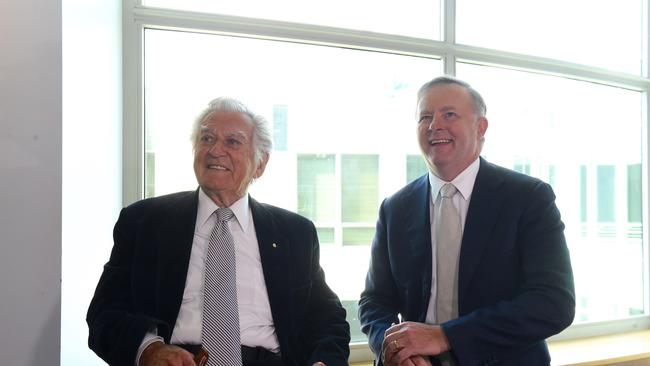
In Hawke’s time journalists still protected his private life in all its personal indiscretions even when he had publicly conceded his flaws, sins and infidelities. However, it is also true that senior political journalists were convinced Hawke could not transition into politics without reforming much of his personal life. Bramston quotes strong assessments during the late ’70s to the effect from Michelle Grattan, Laurie Oakes and the author.
Like all PMs who are deposed by their parties, Hawke took years to recover from his 1991 removal by Keating in a party room ballot. His resentments were impossible to disguise and his dissatisfaction with Keating’s 1993 election victory was apparent. For many years he had strained relations with the party but, in the end, Hawke and Keating reconciled and Bramston points out this was some years before Hawke’s death.
Hawke was a phenomenon never be repeated, the product of a special place and time. Some PMs enjoy popularity for 12 months, even for a full three-year term but Hawke drew on a bank of popularity that lasted, in fluctuating degrees, for 10 years. He was generous enough to attribute much of his success to the quality of his ’80s cabinet, probably the best or second best since Federation. But that comment invites more judgments about Labor today.
Plibersek called Bramston’s book “a massive, compelling, meticulously research biography”. It is the story of a flawed man whose dedication to public life left Australia “for the better, forever”. Australia has improved in many ways since the age of Hawke but there is no escaping the decline of its public policy outcomes and the impaired ability of its political system to meet the national challenges.




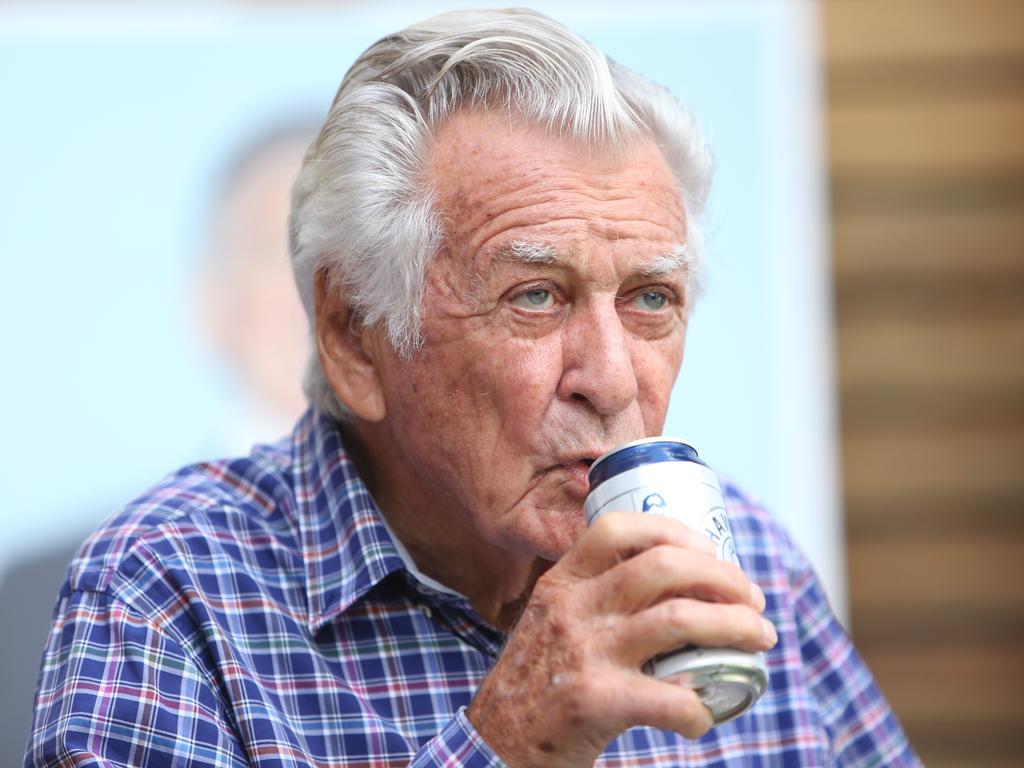



That Bob Hawke is still invoked as a model nearly 40 years after taking office proves his enduring legacy – but rekindling the Hawke flame is a reminder of what Australia has gained and, more critically, where we are diminished as a country.